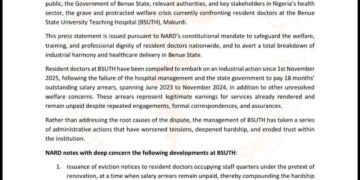Echeune Ondugbe is a Makurdi based father of six. He has just received his retirement benefits after having served his State for 35 years. Echeune had earlier planned to invest the money in petty trading. But now he is no longer too sure. He is scared by the unpredictable nature of the investment climate.
Terkura Ande lives in Jos with his three children. He had earlier planned to train the children up to the university level. Now he is no longer sure of the wisdom in that plan. Orbunde’s hesitation is understandably due to the unstable nature of the time table of university education in Nigeria today. How long will such a training last? What quality of education will be imparted? What were the chances of their being employed after such training?
Echeune and Terkura, though different people, have a common problem. The fear of uncertainty. Uncertainty in the economy and education system. Yet, this fear is neither peculiar to Echeune and Orbunde nor the economy and the education system. It is not peculiar to this age either.
The history of the uncertainty scare is the history of man and it is all-pervasive. It is one of the greatest and most powerful emotions that has ruled and will continue to rule man’s life.
As a child grows gradually into adulthood and develops the capacity for reasoning, he gets puzzled by the unknown and unpredictable circumstances around him. To him, the dawn of each day enforces the growing belief that there are actually more elements of the unknown than the known.
The events of next year, month, week, day, hour, minute and even the next second are mysteries to man. Whatever he does today is but a mere gamble for he knows not, even in the slightest form, what effects it would have on the next day. It is true that man sometimes make intelligent guesses, they still remain mere guesses and subject to uncertainty.
As he grows, man realizes that certain things he had been scared of in the past at a younger age are actually harmless and even useful. He then bites his fingers and says “If I had known, I would have behaved that way”.
Read Also: NASS Members Are Opposing Me – Alia
Man’s regret over certain actions taken earlier due to the fear of uncertainty is so strong that given the opportunity, he would most certainly have a completely different approach to them. But the problem is that he can still not be sure of the new approach as the problem of uncertainty is still there.
The situation then is that, one moment, man has the freedom to do as he chooses with little or no obstacle hindering his progress but the next moment he meets with unexpected events and conditions that he can neither avoid nor rise above. His ability to withstand or survive these unforeseen obstacles of life depends largely on his strength of character. This is perhaps where the game of survival of the fittest comes in.
Essentially, this is how man travels through the rough path of life.
The question then is, is life worth all the risks and pains, fluctuations and frustrations, joys and sorrows that attend uncertainty? Perhaps, for lack of a better answer to this question and the urge to provide a solution to the problem, man sometimes contemplates suicide as the easiest and permanent way out. Unfortunately, he can’t be sure that suicide will indeed provide a lasting solution since he does not know and cannot predict what lies beyond death and the grave.
That is how dangerously encompassing the problem of man’s fear of uncertainty has been and will most likely continue to be. In fact, this fear has led to the elimination of real and imagined enemies by leaders; it has made tyrants and dictators out of rulers; revolutionaries out of subjects and cowards out of men. It has caused relationships, homes, business agreements among others to break down.
This fear and the consequences are perhaps more pronounced today due to the various challenges occasioned by our situation and the generally shaky and transient nature of things. Hardships, betrayals, disappointments among others all add up to further accentuate this fear today.
But how can this scare be out lived?
The best approach is to accept the fact with an open mind that life itself is a gamble and that the ‘ifs’, ‘maybes’ and ‘mights’ of life are necessary components of this gamble. We should also learn to be satisfied with the present with which we are fairly familiar, as attempts to predict the future will remain mere attempts that are bound to be beclouded by the thick blanket of uncertainty. We must then make maximum positive use of this familiarity, accepting that the uncertainty of the future is a mark of our limitations for being human.
In the face of the difficult times we live in, this suggestion may sound too abstract, too philosophically submissive even. Yet, it is the only way, for now, to reduce the mental torture associated with uncertainty. It is the only way to live with uncertainty and beat the fear it imposes!






